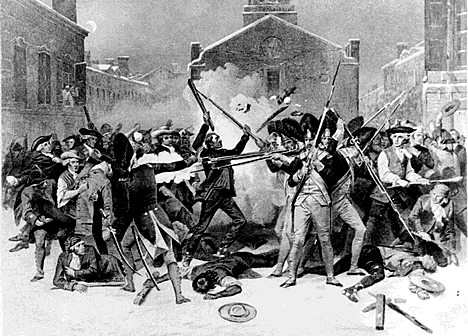Vocabulary
| boycott |
Loyalist (Tory) |
Patriot |
| duty (tariff) |
Writs of Assistance |
congress |
| minuteman |
salutary neglect |
repeal |
Laws passed by Parliament that directly affected the British Colonies
|
Name of the law
|
What the law did
|
How the colonists reacted |
|
Sugar Act 1764
|
Raised the duties on sugar and certain luxury items imported into the colonies.
|
Denounced it as being a tax law disguised as a law to regulate trade; said that taxation was their right alone.
|
|
Stamp Act 1765
|
Placed a tax on newspapers, pamphlets, legal documents, playing cards, and even dice.
|
Denounced it, accusing Parliament of taking over the right of internal taxation, once reserved only for the colonial legislatures. Boycott organized.
|
|
Declaratory Act 1766
|
Asserted Parliaments right to tax the colonies as it chose.
|
Ignored the law
|
|
Townshend Acts 1767
|
Placed a tax on glass, lead, paper, paint, and tea imported into the colonies.
|
Argued that Parliament had no right to tax them without their consent. Customs officials and buildings attacked. Items boycotted.
|
| Tea Act 1773 |
Granted monopoly on imported tea to East India Company. Lowered price of tea, but it was still taxed. |
Opposedanytax. Feared monopoly was the first of many and would endanger free trade. Son of Liberty carry out Boston Tea Party. |
|
"Coercive" or"Intolerable" Acts 1774
|
Series of laws that punished the colonies - mostly Boston. Closed the harbor, forbid public meetings, and forced citizens to provide quarters for British soldiers.
|
United many of the colonists in their opposition to distant royal rule. Prompted the colonists to organize the Continental Congress.
|
 |
 |
| Sketch of the Boston Massacre |
Tombstone of those killed |
 |
| Boston Tea Party |
 |
| Map showing the proximity of Lexington and Concord to Boston |
 |
| Signing of the Declaration of Independence |
 |
| the Battle of Bunker Hill |
 |
| Washington and his men crossing the Delaware River |
Name that Patriot
This Patriot worked tirelessly to promote the spirit of rebellion in the colonies. To spread his anti-British ideas, he wrote brilliant pamphlets. He helped organized the Committees of Correspondence and was a delegate to the First Continental Congress. The British finally ordered his arrest, but he escaped. He was also a brewer and the most familiar member of the Sons of Liberty.
This Patriot proposed the Albany Plan of Union, a far-sighted scheme to strengthen colonial unity and defenses. He acted as a diplomat for Massachusetts in London, reporting upon British reactions to colonial affairs. He was also a printer and inventor.
This lawyer from Virginia was 26 years old when he argued and won a case against the Crown, the Parson’s Cause. In the House of Burgesses, he spoke out so boldly against King George III that some members accused him of treason. He was a delegate to the First Continental Congress and later, echoing the sense of unity that was developing among the colonies, said, “I am not a Virginian, but an American.” He also was quoted as saying, “Give me liberty, or give me death.”
This Patriot was a well-known engraver and silversmith in Boston. In April, 1775, he arranged to signal the countryside of British troop movements by putting a lantern in the North Church steeple. He then rode to Lexington to give further warning.
This Patriot, who had inherited great wealth from his uncle, used his ships to smuggle cargo into the colonies rather than pay British duties on them. He enjoyed being a popular idol in the Patriot cause. When the British decided to arrest him, he escaped with another famous Patriot. Legend says he signed the Declaration of Independence in such a way that King George III would not need his glasses to read it.
During the French and Indian war, this Massachusetts lawyer attacked the Crown for issuing writs of assistance. Arguing that “a man’s home is his castle,” he denounced the writs as a violation of the people’s natural right to liberty. His arguments were credited by one Patriot with bringing about the birth of American independence. He also promoted the idea of "no taxation without representation."
This Patriot, as a colonel in the Virginia militia, fought in the opening skirmish of the French and Indian War. Although slow to join the opposition to British policy, he eventually saw the futility of petitioning Parliament for change. Because he was widely respected, his presence at the First Continental Congress was important. He was later chosen to lead the Continental Army.
 |
| The three branches of government |
 |
| Checks and Balances |
 |
| Signing the United States Constitution |
|

|
|
Not all curious onlookers were able to witness the signing
|